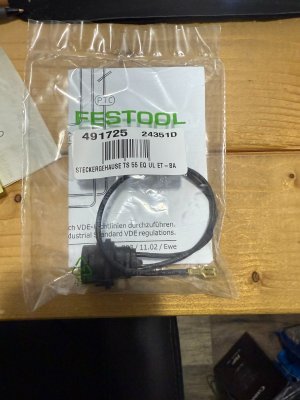JimH2 said:
...
There are no legal ramifications to using a 110v tool in the US. No reconfiguration or opening of the tool is required.
...
Well, this thread
is about modifying a tool in a specific way.
Secondly, what you write is not universal due to some tools operating at increased rpm due to the 60Hz power. Which may be out of spec for a given machine. Sure, that is not the case with the TS 60 using full-conversion drivers.
But in general advising such broadly on the general public internet is just negligent. You never know who will take that for granted. Especially since this forum is semi-official, being run by FestoolUSA.
...
Advice not to do it fine, but the legal/non-legal issues are absurd.
...
That statement was not written lightly and words were chosen.
TLDR:
I did not use "
legality" in that sentence - which you seem to reply to. Not aware of any "legality" issues indeed.
...
That statement holds true for running *any* non-approved/non-standard equipment. You are on your own -> should anything bad happen, you are fully responsible for the consequences, and a bit beyond in practice. It is legally (close to) manufacturing own tool and then using it. Nothing illegal about it as a consumer, in *most* jurisdictions. But OHSA & Co. will want to have a word the moment you give that tool to an employee. And the insurers will want to have a word if there is a fire and there is a suspiction the tool caused it..
When we use complaint tools /or bought from an official source like with Mafell/ BIG part of the liability goes to the tool make or the importer. That is not the case once a tool is modified. All that liability, however limited, moves onto the "maker".
Not sure how it is in the US precisely with OHSA & Co. Over here, that means ANY certification the manufacturer did to prove the safety of a tool gets invalidated by a major modification. This means the authorities may require them to be (re-)proven by the employeer if a tool was modified. Sometime electrical revision report is enough. Sometimes not. It may be a pretty major chunk of change to get that, so companies tend to modify tools only if a major benefit is gained by doing so. Not worth the (legal) hassle.
These are the "legal" issues I referred.
As for the non-legal ones, those are the technical things like parts availability, the potential arcing aspect discussed earlier, etc. In this specific case they are mostly OK though. I would personally take the plunge.
But would never blankedly/publicly advise it to anyone I do not know his skills with electrical stuff or his legal standing ref. company/DYI/etc.
All I ask is we avoid
blanket statements anything non-compliant with regulations is "OK" just because it is so *for me*. Whoever "me" means.

